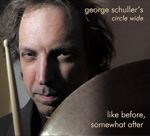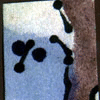|
about
This is Schuller's second recording with his longstanding working band, Circle Wide (formerly known as Chump Change), and the long-awaited follow-up to its 2003 homage to Miles Davis' pre-fusion transitional period, Round 'Bout Now (PSR#J021302). Three decades after the demise of Jarrett's underappreciated ensemble, Circle Wide reinvents six of its favorite tracks from the Jarrett catalog, some of which it has been performing live in New York for years, and documents two Schuller originals inspired by the source material.
"Keith Jarrett's American Quartet, featuring saxophonist Dewey Redman, bassist Charlie Haden and drummer Paul Motian, is generally regarded as one of the more exciting and influential working jazz bands of the 1970s," writes journalist Bill Milkowski in the liner notes. "Together [Schuller and Circle Wide] succeed in capturing the amazing elasticity and rarefied inside/outside aesthetic that Jarrett achieved 30 years ago."
|
|
Reviews
| Top 10 of 2008 |
| — Mike Shanley, JazzTimes |
| Top 10 of 2008 |
| — Chuck Obuchowski, Hartford Courant |
| Top 10 Jazz Recordings of 2008 |
| — Gary Funston, Host of WTJU's "Living Time" |
| The 50 Best Jazz CDs of 2008 |
| — Jazz.com |
| Best New Releases of 2008, Honorable Mention |
| — AllAboutJazz-New York |
| Best Records of 2008: Honorable Mention |
| — AllAboutJazz-New York |
| The band, now called Circle Wide, has a vividly original sound. McCaslin is becoming an essential contemporary player and Shepik brings a range of colours unique to himself. |
| — The Penguin Guide to Jazz Recordings, 9th. ed. |
| Like original Quartet drummer Paul Motian, Schuller's playing is loose and elastic on the freer tunes ("Dew Point") and positively swinging and propulsive (nice brush work throughout) on the more temporal material ("Common Mama")..."Encore, b" finds the drummer's ride weaving in and out of Jarrett's rich changes. It also features a whirlwind solo spot full of rumbling crescendos and power. |
| — Ilya Stemkovsky, Modern Drummer |
| Whether or not drummer George Schuller can jumpstart a movement that places Jarrett's compositions into general circulation as repertoire remains an open question, despite his and Circle Wide's success in renewing them. Schuller's two originals – the roiling Redman-inspired "Dew Point," which sounds like it comes from Motian's book in the '80s,
and "Back to School," which morphs from ballad to Ornettish Latin contours, are so well integrated into the program that composer credits have to be double checked on the first few plays. |
| — Bill Shoemaker, Jazz Review |
| Jarrett's melodies have such a strong fingerprint that you might wonder what Schuller can do to change their identity; the answer lies in a variety of factors. First is Schuller's own rhythmic imagination, which allows him to accent and complicate the beat of such songs as "Rotation" and "Common Mama" while remaining true to the original pulse. Another is the expansion of the tonal pallette to include guitar (Brad Shepik) and vibes (Tom Beckham) – but no piano. And then there's the inspired choice of the outstanding tenorist Donny McCaslin to round out the sextet. |
| — Neil Tesser, Jazzit |
| Drummer George Schuller's fertile imagination, deep love and respect for jazz musicians of previous eras has led him to this tribute to the so-called American quartet of Keith Jarrett from the mid '70s with this extraordinary unit Circle Wide. This is one of the more delightful recordings of modern jazz made in the 2000's, a definite candidate for Best Jazz CD of 2008, and a high watermark in Schuller's substantial career. It also is a marvelous tribute to Jarrett's thoroughly modern jazz band that ranks up there with the famous small ensembles of Miles Davis, John Coltrane and especially Ornette Coleman. |
| — Michael G. Nastos, All Music Guide |
| Recommended New Release (June 2008) |
| — David Adler, AllAboutJazz-New York |
| ...falling in love with Like Before, Somewhat After is one physical phenomenon that even the left-brained among us can understand with ease. |
| — Karla Cornejo, AllAboutJazz-New York |
| La grande trouvaille de George Schuller est d'honorer sans piano la musique de Keith Jarrett, avec l'aide d'un vibraphone inspiré (Tom Beckham) et d'une pétulante guitare électrique (Brad Shepik). En réécoutant les versions originales de Common Mama, Rotation ou De Drums, on apprécie encore plus l'intelligent travail de relecture de George Schuller, qui rend ces compositions actuelles et vivantes, alors que personne ne les a jamais reprises et que Jarrett, lui-même, ne les reprendra certainement jamais. De plus, Schuller réussi l'exercice périlleux de ressusciter la géniale Survivor's Suite, en privilégiant le sentiment impressionniste, à la copie de la réalité, dans une atmosphere sonore aux coulers musicales inédites...passionnante et inspirée. |
| — Lionel Eskenazi, Jazzman |
| They get past the notes on the page and into something deeper, an elusive transcendence that defies even this glib critic. |
| — Ted Gioia, Jazz.com (Song of the Day 6/4/08) |
| ...Like Before, Somewhat After sits comfortably next to the past works the group admires. |
| — Pat Buzby, Signal to Noise |
| ...a tribute album that exceeds its goals because it isn't satisfied with a simple tip of the hat. Circle Wide has played these Jarrett pieces in concert, some for several years, and these performances show it. They've added to them their own personality and signature. |
| — Mike Shanley, JazzTimes |
| Melodies are frequently stated in unison by saxophone and guitar following various introductory instrumental strategies, setting the scene for individual extrapolations against thoughtfully arranged backdrops. Instruments imperceptibly switch roles, subtly shifting from background to foreground with well-oiled precision. |
| — John Sharpe, AllAboutJazz.com |
| A criminally under-appreciated drummer and bandleader, Schuller has just released an homage to Jarrett's quartet. Very interesting, and I'm digging the way Schuller takes liberties – particularly on one of my favorites from Jarrett's Fort Yawuh: "De Drums." This is great music that deserves to be re-discovered. |
| — James Hale, Jazz Chronicles (blog) |
| Like Jarrett's American Quartet, Schuller's Circle Wide is a group where nobody's a star and everyone's a star. With plenty of outstanding solos, it's the interaction of the group – and its ability to approach this unequivocally lyrical material with the relentless pursuit of free expression – that makes Like Before, Somewhat After stand out as both a fine tribute and an album that stands on its own very fine merits. |
| — John Kelman, AllAboutJazz.com |
| ****...Schuller revisits the funky syncopated gem "Common Mama" with fresh energy, the expressive two-part "Survivor's Suite," a rocking "Rotation" and the easy going "De Drums" as if originals. Schuller, Beckham, McCaslin and Ambrosio evoke the spirits of Paul Motian, Gary Burton, Dewey Redman and Charlie Haden. |
| — John Ephland, DownBeat |
| Embracing the lyricism inherent in Jarrett's writing, Schuller's ensemble offers one of the most euphorically adventurous albums in recent memory. Effortlessly moving between freedom and formal structure, Circle Wide embraces the same malleable, inside-outside aesthetic that the American Quartet excelled at. Like Before, Somewhat After invokes the bittersweet intensity of Jarrett's formative work, making this richly rewarding tribute one of Schuller's most beautiful and accessible albums. |
| — Troy Collins, AllAboutJazz.com |
| What I liked is that it takes the politeness out of Jarrett's music, and puts an earthier taste into it without in any way violating the beauty of these admittedly very beautiful tunes. Keith will probably wince at parts of it, though secretly I suspect he'll be mollified. His contribution as a composer was overdue for recognition. |
| — Brian Morton, PointofDeparture.org |
|
 [PSR#060607]
[PSR#060607]
